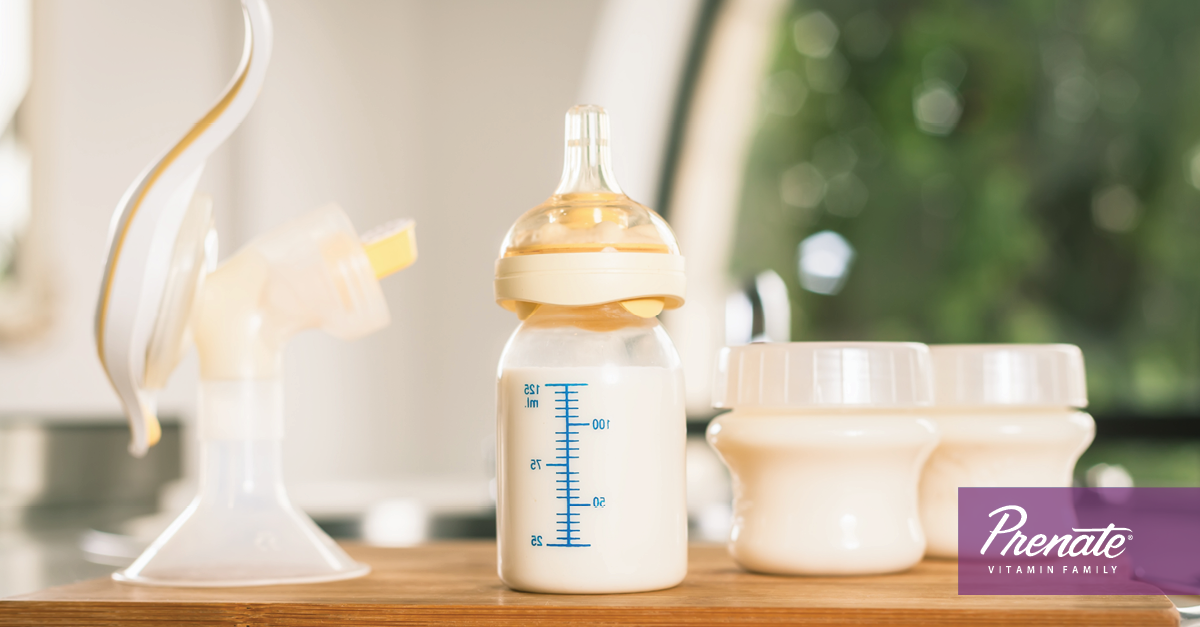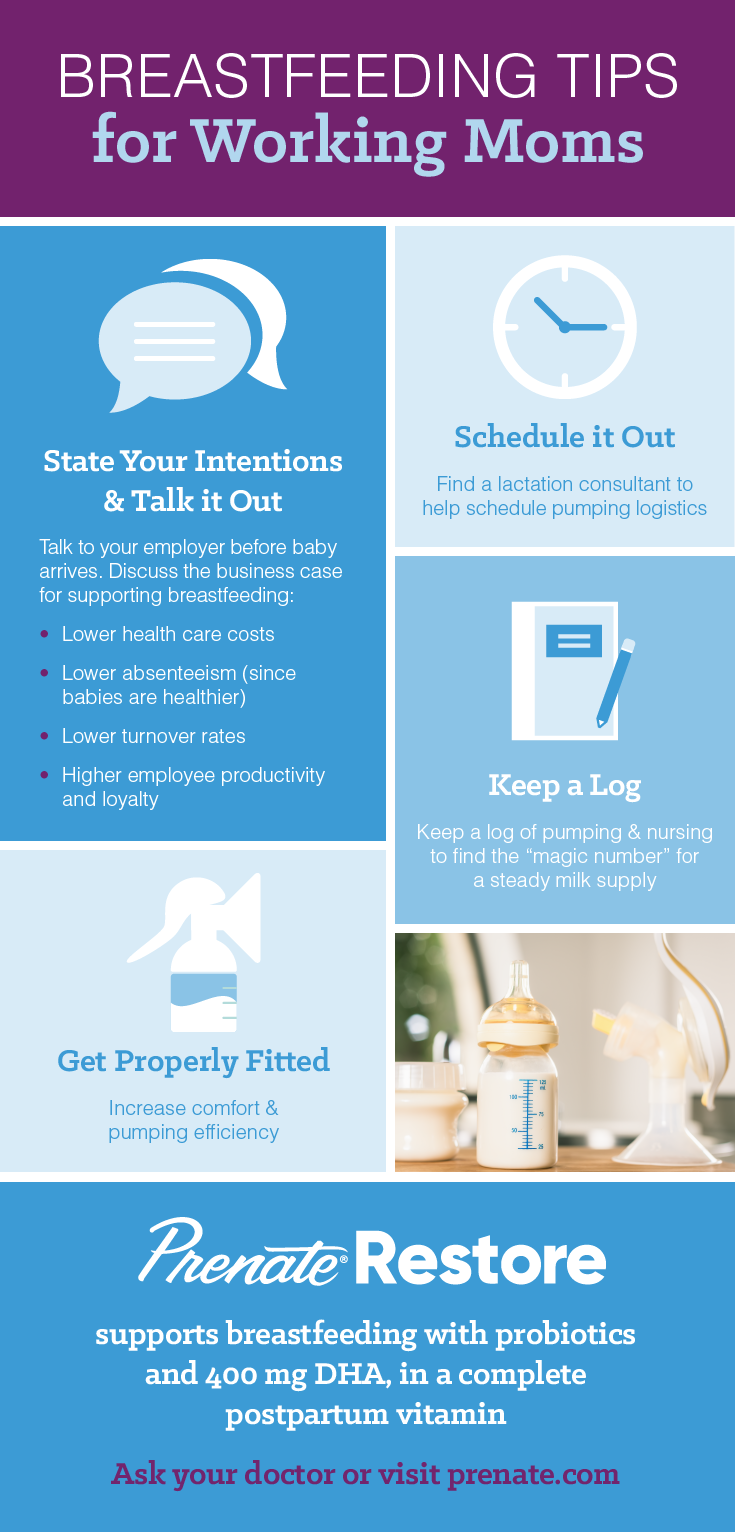Breastfeeding Tips for Working Moms
August 10, 2017
While many women have the best intentions of breastfeeding their babies exclusively for the first six months, returning to the workforce can create obstacles.
If a mother and baby are able to achieve a good latch early, exclusive breastfeeding is more likely to last longer (in some circumstances). But in the United States, the Family and Medical Leave Act (FMLA) only allows working mothers up to 12 weeks of job protection due to pregnancy or after the birth of a child. While some employers are able to provide a paid leave of absence during this period, many others do not. This means that working mothers who need the income from their jobs may feel pressured to return to work sooner.
If you are a new mother who plans to return to work, you may feel overwhelmed by the challenge of continuing to provide breast milk for your baby while meeting the demands of your job. Here are some tips to help you stick with breastfeeding.
State Your Intentions and Talk It Out
It’s essential to talk to your employer before your baby arrives about your intentions to return to work and continue to breastfeed. Give your employer a proposed schedule and make a case why your request should be supported. Many businesses have learned to support nursing mothers at work because of the long-term benefits of their decision: lower health care costs, lower absenteeism (since babies are healthier), lower turnover rates, and higher employee productivity and loyalty.1 The Office of Women’s Health provides online resources on how businesses can support breastfeeding mothers:
• The Business Case for Breastfeeding
• Breastfeeding Solutions By Industry
Schedule It Out
If you’re not able to bring your baby to work, pumping can be an alternative that ensures he or she continues to receive the health benefits of your breastmilk. Find a lactation consultant who can help you work out a pumping schedule that’s tailored to your work schedule. Map out when to start collecting milk after your baby is born, and the ideal times for both feedings and pumping to keep your milk supply balanced.
Keep A Record
Keep a log of how many milk removals you do in a day, including nursing and pumping. Track the amount of milk pumped to find the “magic number” of feedings and pumping that keep your supply steady. This can help prevent a dip in milk production when you do go back to work.
Get Properly Fitted
If you are just beginning to learn about breastfeeding, you may not know that every breast pump is created the same. Each model can be very different from one another. One of the biggest differences in pumps is in the design of their breast shields. Having a properly fitted breast shield will improve comfort and pumping efficiency. If a breast shield is too large or too small it can cause pain and reduce the amount of milk you can pump. Keep in mind that your breasts may change over the months that you breastfeed. A lactation consultant can help you get fitted for the correct-size breast shield. You can also check the website of your breast pump’s manufacturers for a fit guide.
In addition to fit, the pressure and strength of puns vary. Look into your options for renting hospital-grade pumps. They tend to work better and get milk established quicker than the weaker store-bought machines.
Vitamins for Breastfeeding Moms
Women who breastfeed their babies need increased nutritional intake to restore their reserves and support infant growth. Certain nutrients are especially important during this critical stage of development.
- Calcium and Vitamin D – Because babies have high needs for vitamin D, their mothers often experience loss of bone mass while breastfeeding.2 Calcium and vitamin D work hand-in-hand to help keep a mother’s bones strong while their baby’s bones and teeth are developing.2
- Probiotics – Probiotics help regulate the microbes in the gut, and support gastrointestinal and immune health in mothers and babies.
- DHA – Up to 50 percent of omega-3 stores are lost in pregnancy, and six months are needed to restore them postpartum.3 DHA is an omega-3 fatty acid that can help reduce the risk of postpartum depression and improve infant sleep.4-7 For babies, DHA may improve cognitive and motor skills.3-10 Plus, DHA aids in immune development and re- duces inflammatory responses.3,8-10
Prenate® Restore is a once-daily vitamin for breastfeeding that’s designed to support the nutri- tional needs of moms and their babies. Prenate® Restore includes nutrients such as calcium, vitamin D, DHA and probiotics that help infants achieve optimal growth and promote brain, immune system and gut development.11-13 Prenate® Restore is also appropriate during pregnancy, which means that expecting moms can start supplementation with Prenate® Restore before the arrival of their baby and continue taking it through delivery and postpartum. Talk to your doctor to see if Prenate® Restore is right for you.
You Are About To Leave This Website
By clicking continue, this link will take you to a website to which Alora Pharmaceuticals Policies & Terms of Use do not apply. Alora and its subsidiaries do not control the content or accuracy of third-party websites and assume no responsibility for their use.













